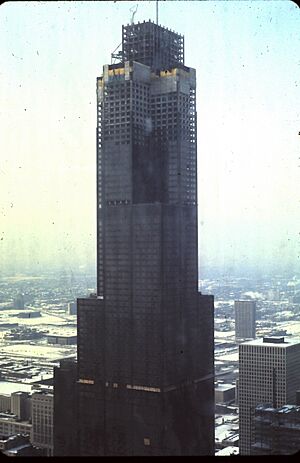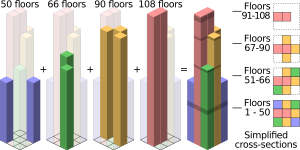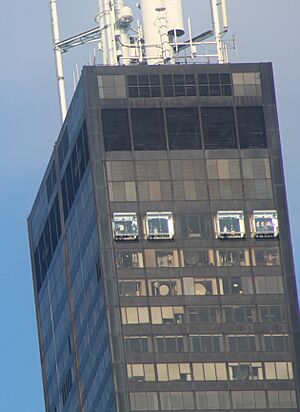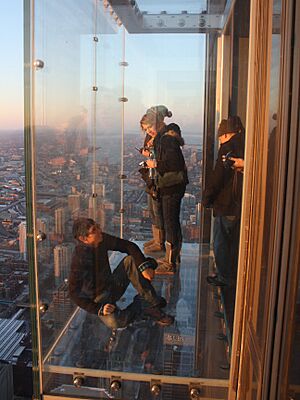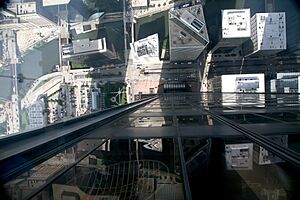Willis Tower facts for kids
The Willis Tower is a super tall skyscraper located in Chicago, Illinois. It's one of the most famous buildings in the world! It was built by a company called Sears, Roebuck and Company and finished in 1973. For many years, it was the tallest building on Earth. The tower is about 442 meters (1,450 feet) tall from the ground to its roof. Two amazing architects, Fazlur Khan and Bruce Graham, designed this giant structure.
Quick facts for kids Willis Tower |
|
|---|---|
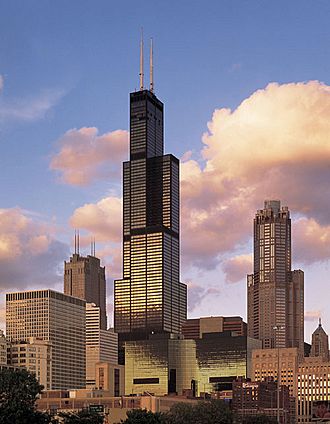
The Willis Tower, then known as the Sears Tower, in 1998
|
|
| Former names | Sears Tower (1973–2009) |
| Record height | |
| Tallest in the world from 1973 to 1998 | |
| Preceded by | World Trade Center (1970) |
| Surpassed by | Petronas Twin Towers |
| General information | |
| Status | Complete |
| Type | Office, observation, communication |
| Architectural style | International |
| Location | 233 S. Wacker Drive Chicago, Illinois 60606 United States |
| Coordinates | 41°52′44″N 87°38′09″W / 41.8789°N 87.6358°W |
| Current tenants | United Airlines |
| Named for | Willis Group Sears (1973–2009) |
| Construction started | 1970 |
| Completed | 1973 |
| Owner | Blackstone Group |
| Height | |
| Architectural | 442.1 m (1,450 ft) |
| Tip | 527 m (1,729 ft) |
| Top floor | 412.7 m (1,354 ft) |
| Technical details | |
| Floor count | 108 (+3 basement floors), 110 floors including mechanical. |
| Floor area | 416,000 m2 (4,477,800 sq ft) |
| Lifts/elevators | 104, with 16 double-decker elevators, made by Westinghouse, modernized by Schindler Group |
| Design and construction | |
| Architect | Skidmore, Owings and Merrill Fazlur Rahman Khan Bruce Graham |
| Main contractor | Morse Diesel International |
| References | |
| I. Willis Tower at Emporis |
|
Contents
History of the Willis Tower
In 1969, Sears, Roebuck & Company was the biggest store company in the world. They had many workers in different offices around Chicago. Sears decided to bring all these workers into one huge building. They needed a lot of space, about 3 million square feet!
Sears hired architects from Skidmore, Owings & Merrill (SOM) to design this giant office building. The main architect was Bruce Graham, and the structural engineer was Fazlur Khan. Together, they created the design for the tower.
Construction on the building started in August 1970. About 2,000 workers helped build it. To make things faster, they even built a concrete mixing plant right in the building's basement! This allowed them to pour a new concrete floor almost every day.
In November 1972, the Sears Tower became the tallest building in Chicago. It was still being built, but it was already taller than any other building in the city. By February 1973, the tower reached its 100th floor and became taller than the Empire State Building in New York City. The building was officially "topped out" (meaning the highest point of the structure was completed) on May 3, 1973.
How the Willis Tower Was Designed
The Willis Tower was designed by architect Bruce Graham and engineer Fazlur Rahman Khan. They came up with a special way to build it using nine square "tubes" grouped together. Imagine nine tall, square towers standing side-by-side in a 3x3 pattern. This made the building very strong and stable.
The total area of the building is huge, about 3.7 million square feet. This design was meant to hold 16,500 employees!
Shape and Outside Look
Each of the nine "tubes" is a square section, about 75 feet by 75 feet. As the building goes higher, some of these tubes stop at different floors. This creates the tower's unique stepped shape.
- The bottom 50 floors have all nine tubes.
- At the 50th floor, two tubes end.
- From the 51st to 66th floors, there are seven tubes.
- At the 66th floor, two more tubes end.
- From the 67th to 90th floors, the building looks like a cross, with five tubes.
- At the 90th floor, three more tubes end.
- Only the two central tubes go all the way to the 108th floor.
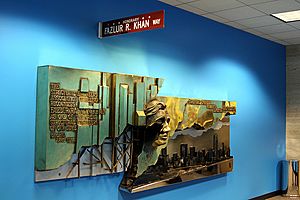
This "bundled tube" design was very new and smart. It allowed the Willis Tower to be very tall (1,450 feet) and have lots of space, but it cost less to build per square foot compared to older tall buildings. This design was so successful that many other supertall buildings around the world, like the Burj Khalifa, have used similar ideas.
In 1982, two TV antennas were added to the top, making the tower even taller, about 1,707 feet. Later, one antenna was made even taller in 2000 to improve TV signals, reaching about 1,729 feet!
The outside of the Willis Tower is covered with black glass and aluminum. There are dark bands around certain floors (like the 29th-32nd and 64th-65th floors). These bands hide the building's air vents and support structures. The rest of the outside has 16,000 bronze-tinted windows.
Around the building, there used to be a large pink granite plaza. In recent years, a new three-level section was built on the west and south sides. This new part has a roof garden and an amazing art piece by Olafur Eliasson called Atmospheric wave wall. It's made of almost 2,000 blue and green steel tiles that light up at night!
Inside the Tower
The Willis Tower uses a lot of materials: about 74,000 tons of steel, 4 million pounds of aluminum, and enough concrete flooring to cover 101 acres! The building's design helps it stand strong against winds up to 130 miles per hour. The very top of the building can even sway a little (about 7 inches) in strong winds, then gently move back.
The building's foundation goes 50 feet deep into the ground. Because the ground was mostly clay, workers dug 201 deep holes, called caissons. Many of these holes went all the way down to the solid limestone layer, which was 100 feet below the ground!
When it was built, the Sears Tower was one of the first buildings in Chicago to have a full fire sprinkler system, even though it wasn't required by law. It has about 40,000 sprinkler heads! The building also has special systems to detect smoke and control airflow in case of a fire.
Many floors in the building, including some in the basement and above the 103rd floor, are used for mechanical equipment.
Elevators and Escalators
The Willis Tower has 104 elevators! Some of them are "double-deck" elevators, meaning they have two cabs (cars) stacked on top of each other. This allows them to carry people to two different floors at once.
Most office floors are served by 97 elevator cabs. Some elevators go directly from the lobby to "sky lobbies" on the 33rd/34th and 66th/67th floors. From there, people can switch to other elevators that go to their specific floors. Two special elevators go straight from the lobby to the Skydeck on the 103rd floor in about 60 seconds!
Six of the elevators are used for moving freight (goods). One of these freight elevators can go to every single floor, reaching a height of 1,440 feet! In an emergency, this elevator is reserved for the Chicago Fire Department.
The building also has 16 escalators, including some very tall ones that connect different levels.
Skydeck Observation Deck
The Willis Tower has a famous observation deck called the Skydeck. It opened on June 22, 1974, and is located on the 103rd floor, about 1,353 feet above the ground. It's the highest observation deck in the United States and a very popular place for tourists.
From the Skydeck, you can feel the building sway a little in the wind. On a clear day, you can see for miles across Illinois and even across Lake Michigan into Indiana, Michigan, and Wisconsin!
In 2009, the Skydeck was updated with special glass balconies called "The Ledge." These glass boxes stick out about 4 feet from the building on the 103rd floor. When you step into them, you can look straight down to the street below through the glass floor! It's an amazing and a bit scary experience. In 2022, a fifth glass ledge was added.
Height of the Willis Tower

When the Sears Tower was finished in 1973, it became the tallest building in the world! It held this record until 1996.
Even though it was the tallest building, it wasn't the tallest structure in the world. The CN Tower in Toronto was taller, but it's considered a "tower" because it doesn't have floors all the way up like a building.
Today, the Willis Tower is still very tall. It is the third tallest building in the Americas and in the Western Hemisphere. Only One World Trade Center and Central Park Tower in New York City are taller.
For a while, other buildings had taller antennas or spires. But in June 2000, when the Willis Tower's western antenna was extended, it became the tallest building by "pinnacle height" (meaning including its antennas) for a short time.
Interesting Facts About the Willis Tower
- The tower is the third-tallest building in the Western Hemisphere. It's also the 23rd-tallest in the world.
- It has 108 stories if you count them in the usual way. However, the building's owners sometimes count the main roof as 109 and the mechanical roof as 110.
- More than 1.7 million people visit the Skydeck observation deck each year. It's the highest observation deck in the United States.
- The Willis Tower was originally called the Sears Tower. This was because the company Sears paid for it and had its main offices there until 1994.
- The tower cost about US$150 million to build back then. That would be like $800 million today!
- On May 25, 1981, a climber named Dan Goodwin climbed the outside of the tower while dressed as Spider-Man! He used suction cups and other tools. The Chicago Fire Department tried to stop him, but he made it to the top after seven hours. He was arrested for trespassing.
- In August 1999, another famous urban climber, Alain "Spiderman" Robert, climbed the building using only his bare hands and feet. A thick fog made the last 20 stories very slippery!
- Every year since 2009, the Willis Tower hosts "SkyRise Chicago." This is a charity event where people can (legally!) climb the tower's 103-story staircase to raise money. It's the tallest indoor stair climb in the world!
Position in Chicago's Skyline

Related Pages
Images for kids
-
Willis Tower as viewed from Chicago's Chinatown
-
Willis Tower as seen from John Hancock Center observation deck
-
900 North Michigan, Park Tower, the John Hancock Center, the Trump Tower, and Aon Center (L-R) as seen from Willis Tower Skydeck.
-
View of Willis Tower from John Hancock Center
-
The Eisenhower Expressway and Jane Byrne Interchange (looking west from Willis Tower)
See also
 In Spanish: Torre Willis para niños
In Spanish: Torre Willis para niños
 | George Robert Carruthers |
 | Patricia Bath |
 | Jan Ernst Matzeliger |
 | Alexander Miles |


